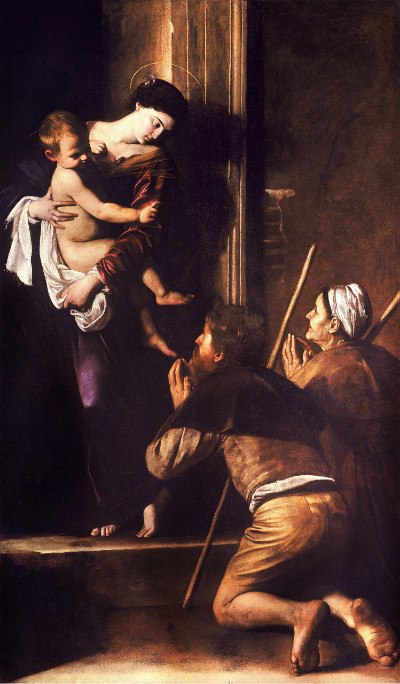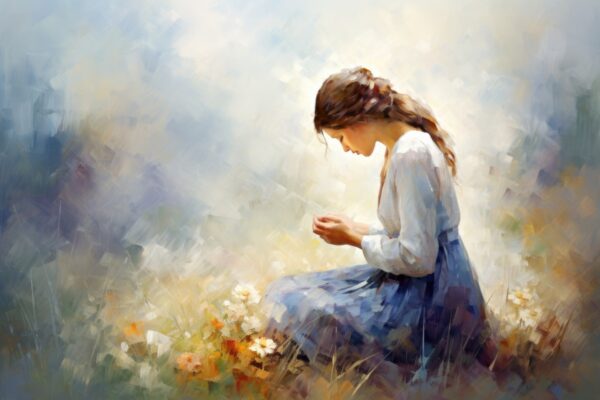Displayed in a small side chapel of Sant’Agostino in Rome is an arresting painting by the great Baroque artist Michelangelo Merisi da Caravaggio. The work, “Madonna of the Pilgrims,” shocks viewers with its unapologetically raw depiction of weary pilgrims who have, at long last, reached their destination. Earth and filth cling to the two kneeling figures whose clothes are ragged and whose feet are calloused and bare. Standing before them is a haloed woman of splendid beauty holding a child whose fleshy form is almost entirely bathed in light. The anonymous worshippers have, after much adversity, found themselves at the feet of the Madonna and Christ Child.
Gazing upon this profound image, one cannot help but notice the space to the left of the unkempt pilgrims. In its blankness, its openness, it seems to beckon to the viewer. Like an untaken place at an altar rail, it is an invitation: Come and kneel. Can we? Can we enter this space and allow such beams of love, emanating from the mother and child, to penetrate our beings? Whispers of our unworthiness may bring us pause, but the humble roughness and imperfection of the already present man and woman reassure us. This Advent season, we are called to recognize our littleness and impoverishment and, despite it, fervently seek the Lord. We must allow ourselves to be weary pilgrims.
Want more Radiant? Sign up for our weekly newsletter!
It is a temptation in the spiritual life to do the opposite of this. We may be tempted to rely on our own efforts to grow in holiness and to expect perfection. As we become more virtuous, we may start to attribute this maturation to our own labors and discipline, falling into the belief that we cannot err. Then, when we do stumble and fall, we curse ourselves for being “too weak.” Despair creeps in, for we have forgotten that it is through God’s grace alone that we are able to do anything good. At such times, it is good to recall certain crucial truths: that only Christ can liberate us from our sins; that acknowledging this allows us to seek him out, which is quite pleasing to him; that fretting over our “filth” is a product of pride and not of a love of God, who is infinitely more patient with us than we are with him or ourselves; and that he will always draw goodness and beauty from our “ugliness.” In short, we are nothing more than exhausted, bedraggled wayfarers who rely entirely on the Creator to make our paths straight.

The pilgrims of Caravaggio’s painting reiterate these truths. Though they lack a sliver of prestige, they do not shy from seeking Christ. Like the shepherds on Christmas night, they hasten to the dwelling of the savior even though they can bring nothing aside from adoration. They have a noble awareness of their poverty, but do not regard it as a detriment. Their humility enables them to appear before their king in all of their glorious shabbiness. It is evident that they do not believe the lie that they must be perfect to pay homage to their maker, to seek his face, to bathe in his goodness. And see how he does bathe them in light and splendor! Their faces are luminous, filled with wonder, made youthful with joy! The woman’s wrinkles do not tell of exhaustion, but of gladness. The man’s countenance is like a lamp in the darkness around him. There even seems to be a paradoxical energy in their wearied frames as they bend toward the pair who benevolently bends toward them. What a gift they, in their poverty, have received!
Like these pilgrims, we will inevitably be soiled as we journey through life. Our sins and shortcomings will send us to the earth, leaving us covered in wounds of all shapes and sizes. Even as we travel toward the Lord, our paths will be marked by stones that we will not manage to agilely avoid. Winds will stir up dust that coats our ephemeral flesh. The fabrics of this world with which we clothe ourselves will lose their luster, be torn by thorns, and thin with the passing days. We can only expect to appear before Christ quite scathed and battered by our own weak humanity. But, still, we can rejoice. We rejoice because Christ desires our presence before him. He longs for our weary bones to rest in his gaze. He wants to stretch out his hand in blessing and pour his light upon us. After all, is this not why he came to earth as an innocent babe destined for Calvary?
This Advent, let us fervently seek him with the confidence that we will find him — not because of our own efforts, but because of his love for us. Let us acknowledge our frailty while continuing to move forward, certain that, not only has Christ laid our path, not only does Christ know every pebble upon which we will stumble, but also that his hand is ever outstretched to help us back to our feet. And when we do reach our destination, like the shepherds and the pilgrims, he will greet us with a love that transforms our disordered selves into beings of light. Truly, this is our only task: to never cease our pursuit of the stoop where our Blessed Mother holds her child out for us.




